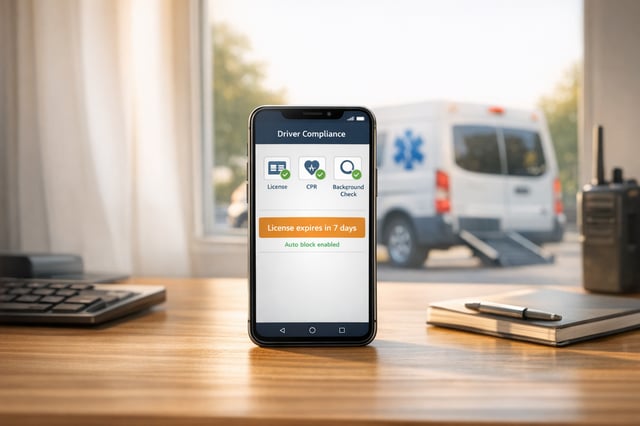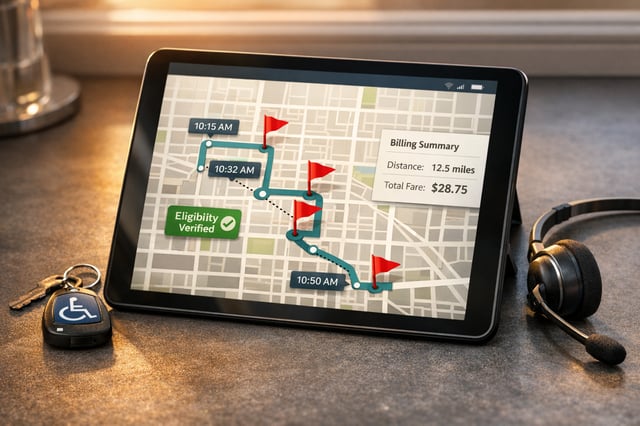

NEMT Entrepreneur provides expert insights, strategies, and resources to help non-emergency medical transportation professionals grow their businesses. Get industry-leading advice to succeed in NEMT.
Featured articles
Essential Certifications and Licenses:
- Business License & FTIN: Register your business with state authorities and obtain a Federal Tax Identification Number.
- NPI Number: Required for partnering with brokers and working with Medicare.
- Driver Requirements: Valid driver’s license, CPR/First Aid certification, clean driving record, and background checks.
- Vehicle Compliance: ADA-compliant vehicles, regular safety inspections, and proper maintenance records.
Compliance and Insurance:
- Insurance: Transport liability, vehicle damage, workers' compensation, and employee dispute coverage.
- Federal Standards: ADA compliance for accessibility and HIPAA compliance to protect patient data.
- Record-Keeping: Maintain detailed logs of trips, driver credentials, and vehicle inspections.
Using Technology:
- Software Tools: Automate scheduling, track certifications, and keep digital records for smoother audits and operations.
Meeting these requirements ensures your NEMT business is legally compliant and provides safe, reliable services.
Required Certifications and Licenses for NEMT Owners
Business License Requirements
To run your NEMT business legally, you’ll need a general business license and a Federal Tax Identification Number (FTIN). These can be obtained through your state's Secretary of State office. Depending on your location, additional permits may also be necessary [1]. The process usually involves submitting the required paperwork and paying fees to state and local authorities.
Driver Certification Needs
Drivers are required to hold a valid driver's license and certifications in CPR and first aid, which must be renewed every two years. They also need to pass annual background checks, complete medical exams, and maintain a clean driving record. The Certified Transport Specialist (CTS) course is a valuable resource, as it focuses on customer service and health safety protocols, helping drivers enhance their skills and service quality.
Vehicle Compliance Standards
NEMT vehicles must adhere to specific legal requirements, including:
- Wheelchair accessibility: ADA-compliant lifts and secure tie-downs
- Safety equipment: Emergency exits and first aid kits
- Inspection records: Up-to-date inspection certificates and maintenance logs [7]
Regular inspections and thorough documentation are essential to avoid disruptions and ensure passenger safety. Keeping detailed records of certifications, licenses, and compliance documentation not only protects your business but also ensures smooth operations and high-quality service. Proper insurance coverage is another critical factor for NEMT businesses.
Insurance and Compliance Requirements
Insurance Coverage Needs
Having the right insurance in place is a must for running a NEMT business. The right policies help safeguard your business, vehicles, employees, and passengers from potential risks.
Here are the main types of insurance you’ll need:
| Insurance Type | Purpose | Key Coverage Elements |
|---|---|---|
| Transport Liability | Covers passenger-related claims | Accidents, injuries during transport |
| Vehicle Damage | Protects NEMT vehicles | Physical damage, collisions |
| Workers' Compensation | Protects employees | Work-related injuries, illnesses |
| Employee Disputes | Guards against employment claims | Workplace disputes, discrimination |
When choosing an insurance provider, don’t just go with the first option. Get quotes from several companies, and weigh the cost against the level of coverage offered to ensure your business is fully protected.
Record Keeping for Compliance
Accurate record-keeping is just as important as having insurance. It ensures your NEMT operations stay compliant with regulations and helps you avoid legal issues. A strong system should cover these three main areas:
- Trip Documentation: Keep logs of all transports, including pickup times, destinations, and service details.
- Driver Records: Ensure driver credentials and compliance documents are always up to date.
- Vehicle Documentation: Maintain records such as:
- Regular maintenance schedules
- Safety inspection reports
- Equipment certifications
Using specialized software can make compliance easier by automating documentation and reducing errors [1]. Organize your records into clear categories (e.g., trip logs, driver files, vehicle records) to simplify audits and ensure quick access when needed.
Good record-keeping doesn’t just help with legal compliance - it also strengthens trust with brokers, clients, and regulators. Regular internal audits can help you catch and resolve any compliance issues before they become bigger problems.
License & Credentials for Non-Emergency Medical Transportation
sbb-itb-cef70f4
Using Technology for NEMT Compliance
Technology plays a crucial role in helping NEMT (Non-Emergency Medical Transportation) businesses handle compliance tasks, minimize errors, and improve daily operations. It simplifies challenges like documentation, scheduling, and tracking certifications, making compliance easier with less manual effort.
NEMT Routing and Scheduling Software
Routing and scheduling software is at the heart of modern NEMT operations. It helps businesses keep accurate records while managing everyday tasks more effectively.
| Software Feature | Compliance Benefit | Operational Impact |
|---|---|---|
| Automated Scheduling | Matches drivers to patients correctly | Cuts scheduling errors by up to 30% |
| Real-time Tracking | Creates detailed trip records | Boosts route efficiency by 25% |
| Digital Record Keeping | Simplifies audit preparation | Automates compliance reporting |
| Maintenance Tracking | Keeps vehicle certifications current | Avoids service disruptions |
For instance, some NEMT software platforms combine trip scheduling, compliance tracking, and document storage into a single system [1]. These platforms can handle tasks like monitoring driver certifications, saving vehicle inspection records, and documenting trips automatically, helping businesses stay aligned with regulations.
NEMT Entrepreneur

NEMT Entrepreneur is a useful resource for business owners navigating compliance technology. It provides actionable advice on:
- Choosing the right software tools
- Setting up digital compliance systems
- Training employees on new tech
- Improving operations while staying compliant
To make the most of technology in your NEMT business, consider these approaches:
- Regular System Audits: Check compliance features monthly to confirm proper documentation and smooth functionality.
- Staff Training: Train employees thoroughly on how to use compliance software to minimize mistakes.
- Software Integration: Ensure your tech tools work well together to maintain compliance across all aspects of the business.
Using the right tools not only helps with compliance but also sets your NEMT business up for long-term success and smoother operations.
Conclusion and Key Points
Running a compliant NEMT business means meeting certifications and regulatory standards to ensure safe and lawful operations. Success hinges on maintaining compliance across various areas while using efficient systems for tracking and verification.
Here’s a breakdown of key focus areas:
| Requirement Category | Key Components | How to Implement |
|---|---|---|
| State-Specific Requirements | Operating Permits, Certifications | Track compliance across jurisdictions |
| Technology Integration | Digital Compliance Systems | Use automated alerts and verification |
| Quality Assurance | Internal Audits, Performance Metrics | Conduct regular reviews and updates |
Modern technology plays a crucial role in staying compliant and improving efficiency. Tools like automated tracking systems and digital documentation help businesses stay on top of certifications and meet regulatory demands consistently.
Top Compliance Priorities:
- Build frameworks for managing compliance in multiple states.
- Use predictive tools for scheduling vehicle inspections and certifications.
- Automate compliance checks to reduce manual errors.
Staying ahead in NEMT operations requires being proactive about compliance. Monitoring regulatory updates and maintaining organized documentation ensures your business meets industry standards consistently [1].
When done right, compliance isn’t just about avoiding penalties - it can set your business apart. By integrating strong systems and leveraging technology, NEMT providers can focus on growth while delivering safe and reliable services [6].
FAQs
What license do I need for NEMT?
To start a Non-Emergency Medical Transportation (NEMT) business, you'll need several key licenses and certifications. These include a state-specific business license, a Federal Tax ID (FTIN/EIN), and insurance coverage that aligns with your state's requirements. Additionally, some states may require specific permits, like those for wheelchair-accessible vehicles or driver certifications. Be sure to check your state's unique licensing rules [4][5].
How do I become a Medicare NEMT provider?
Becoming a Medicare-approved NEMT provider can open up new opportunities for your business. Here's what you'll need to qualify:
-
Business and Operational Standards:
- A valid state business license and Medicare-compliant insurance
- A National Provider Identifier (NPI) for working with brokers
- Vehicles that meet ADA standards and have DOT approval
- Staff who are properly certified and trained
- HIPAA compliance measures in place
- Documentation and Compliance:
Medicare approval not only ensures you're meeting all necessary standards but also gives you access to a broader client base. For specific requirements in your area, check with your local Medicare contractor [6].


